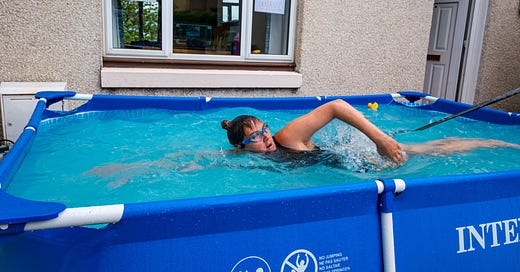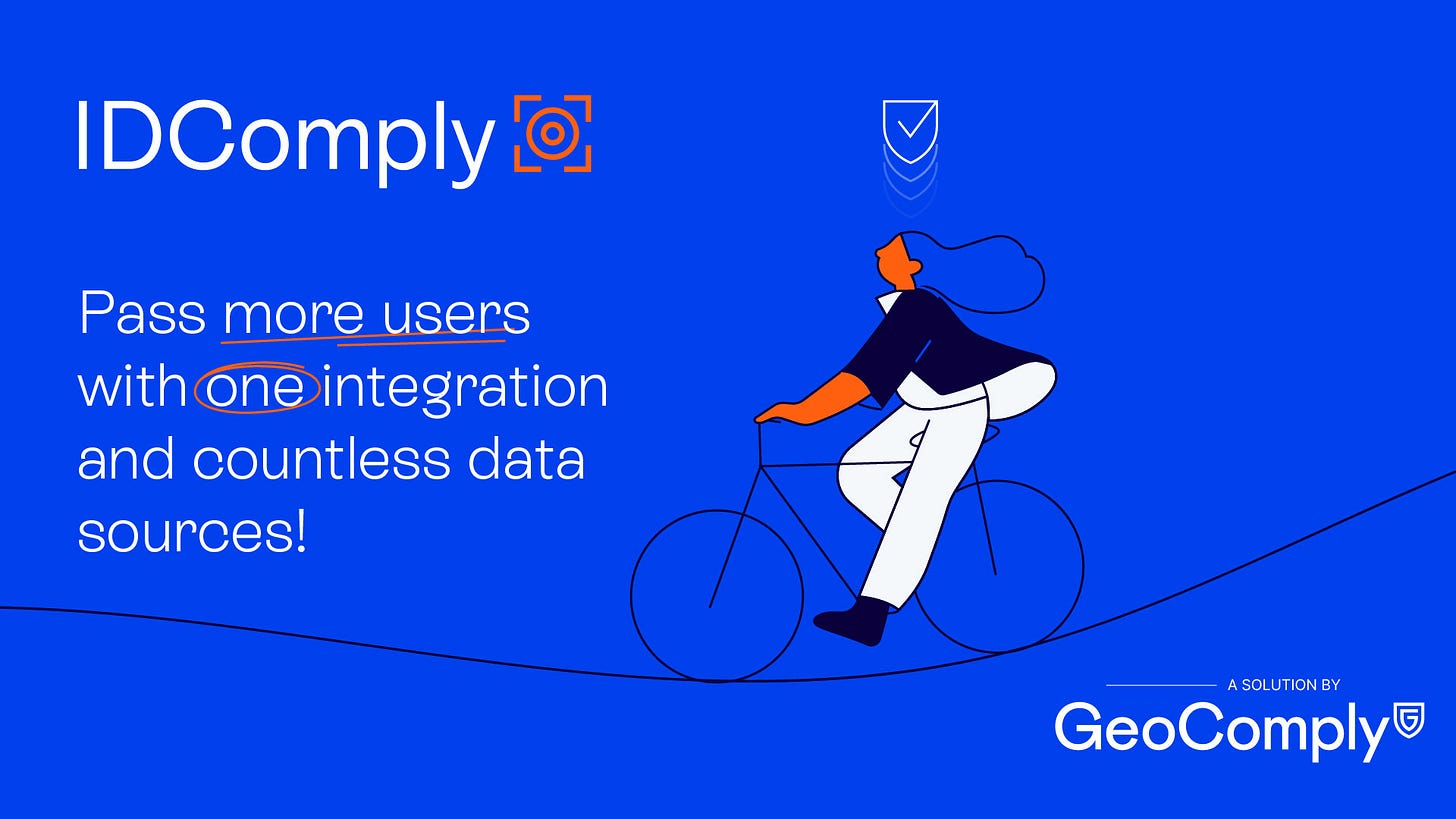Poisoned Penn
The potential for a sale of Penn assessed, online faces up to increased taxes, Raketech’s earnout misery +More
There is a limited number of potential buyers but a lot of strategic sense in a Penn sale.
In +More: Flutter does a Diamond deal, Stake.com’s PointsBet, er, stake.
Tax and spend: the online sector faces up to increased taxes.
The surprising outcome of Raketech’s uncapped Casumba earnout.
I wanna love you, but I better not touch.
Poisoned Penn
Small pool: Only a handful of companies would be willing to throw their hats into the ring to buy Penn Entertainment following the open letter from activist shareholder Donerail calling for a sale of the business.
The team at JMP said a sale is “more complicated than it appears on the surface” given what is a small pool of players and the current macro backdrop.
Two against the field: This chimes with comments from investment insiders spoken to by Earnings+More. As per yesterday’s edition, one source who opted for anonymity suggested there were, in fact, only two likely bidders.
Let’s hear it for the Boyd: The first is Boyd Gaming. The regional operator would be likely to be interested in buying what the Donerail letter described as Penn’s “less flashier” casino assets.
The letter said it was “disappointing” to see how Penn’s failed interactive strategy meant investors now overlooked a “thoughtfully combined” and “highly strategic and valuable” set of 42 properties spread across 20 states.
Sale or return: The issue for a sale to Boyd, however, would be what to do with ESPN Bet. As it stands, Boyd has shown limited interest in operating OSB and instead has a long-standing and deep market access arrangement with Flutter, through which it owns a 5% stake in FanDuel.
But a potential route could be an outright buyout of the whole of Penn followed by the sale of the online business, including the long-term arrangement with Disney for ESPN Bet.
“Boyd would be able to realize value from a sale of the interactive arm, which would reduce the multiple paid on the regional business,” said the investment source.
Hard choice: The other potential buyer is Hard Rock. It would also be enticed by the regional casino assets, and with the buyout of the Mirage – which will become the Hard Rock Las Vegas when it reopens in three-years’ time – it would be able to clearly operate a hub-and-spoke model similar to that of Caesars and MGM Resorts.
In contrast to Boyd, though, the thinking with Hard Rock, which is owned by the Seminole Tribe in Florida, is that it would keep the interactive elements of Penn.
Indeed, its positioning in Florida would make ESPN Bet a much more valuable proposition to it than to another buyer.
The team at JMP said Hard Rock was “flush with cash,” has an existing regional operation and an online business “it can build out.”
Getting value: The pricing of any deal would of course be key. The Donerail letter put the case for why the Penn Entertainment regionals business was undervalued by the market currently. It pointed out that even using conservative transaction multiples of between 6x and 7x, it would mean the fair value for the B&M business was in the range of $5.9bn-$6.9bn.
In comparison, the company’s current enterprise value is around $4.1bn.
Sportsbook platforms don’t go live every day, and certainly not ones as sophisticated as this…
Purpose-built technology, without compromise
Our new technology is built to replicate the autonomy and control of owning your own platform through a smart and convenient outsourced solution
A competitive advantage
This freedom allows our customers to exploit growth opportunities previously reserved only for those with in-house tech and deep expertise.
All without the compliance or operational overheads of ownership, nor the inflexibility and service limitations of alternative providers.
Sounds interesting? Find out more here: www.metricgaming.com
Caustic commentary
Anger is an energy: The letter from Donerail managing partner William Wyatt reserves most of its scorn for Penn’s handling of its interactive operations in the past three years or more. In particular, it tears into the company’s recent online acquisitions.
Barstool: Wyatt said the thesis behind the tie-up with Dave Portnoy’s social media group was “fundamentally flawed.”
“At just 12 months in, it was clear that the bet would not pay off as digital gains were weaker than management had initially forecast and integration efforts were lackluster,” he wrote.
Yet, after laying out $163m for 36% of the company in 2020, Penn then splashed out $388m in early 2023 to take full control of the entity.
Subsequently, of course, it then canned the whole relationship last summer and sold the company back to Portnoy for $1 and for a pre-tax loss of close to $1bn.
theScore: Wyatt also didn’t mince his words on this acquisition, pointing out that Penn laid out $2.1bn for a “small” Canada-based sports media company with less than $25m of annual revenue.
“The principal rationale for acquiring theScore at such a high price was not related to meaningfully increasing revenue or the size of the company, but rather, advancing Penn’s technical sophistications,” Wyatt added.
Naïve: “Had a digitally native and more experienced leadership been at the helm, shareholders have to wonder if this could have been done in a more cost-effective manner from the onset,” the letter continued.
Further, the failed integration of theScore meant that the “incremental $200m+ medium-term adjusted EBITDA” that CEO Jay Snowden promised when the deal was announced was never achieved.
Wyatt noted the entire leadership team that was acquired in the transaction has since left the company.
A dead loss
Then there is ESPN Bet. Wyatt picked up on the recent evidence that ESPN Bet is undershooting expectations, saying this proves there has been “no improvement” in Penn’s ability to execute online.
Premium drinks not included: He pointed out that Penn said previously the estimated cumulative net interactive investment – inclusive of both operating losses and capital expenditures – was expected to be between $200m and $400m over a three-year period.
Donerail cited Snowden as saying it would be “all inclusive.” “However, losses immediately began to pile up that suggest this target will be far exceeded.”
No guiding light: Indeed, in Q4 alone Penn reported an adj. EBITDA loss of $334m for the online business. It also issued guidance for a further adj. EBITDA loss of $400m in 2024. “This guidance was followed by a further guidance revision lower to an estimated $500m loss, at the midpoint of the provided range, just earlier this month,” said Wyatt.
In total, Donerail estimates that Penn has invested $4bn of shareholder capital in its online adventures since 2020 and with precious little to show for it.
“The implied value of that multi-billion-dollar investment made in Interactive is now meaningfully negative,” Wyatt said.
+More
Channel switch: FanDuel is nearing a naming rights deal with regional sport network provider Diamond Sports, replacing Bally’s as the lead name on 18 regional pay-TV networks, according to a report from Bloomberg.
The report suggested the multiyear deal would also involve FanDuel-related programming for the channels.
Meanwhile, FanDuel would resell Diamond’s streaming service to fans and take an equity stake in the company.
The deal between Bally’s and Diamond expires at the end of the current baseball season.
Stake’s stake: The founders of Stake.com, Ed Craven and Bijan Tehrani, have upped their stake in PointsBet to over 5%, according to a filing with the Australian Stock Exchange. The pair have been adding to their position via Stake parent Easygo Entertainment since early March.
Tax and spend
Leveling up: In the debate over the new graduated tax rates in Illinois, the team at JMP noted the apparent discrepancy between OSB and iCasino tax rates and those applicable for B&M gaming.
Online sports betting and iCasino companies have been operating in a “favorable tax environment” even with New York – the largest US sports-betting state – at a 51% tax rate, the team suggested.
The right blend: They noted the blended sports-betting tax rate for the US has increased from 15% to 20% prior to New York to ~20% over the course of the last several years.
Moreover, after the increase in Illinois slated for July 1, only three states – Illinois, New York and New Jersey – have a higher online sports-betting tax rate compared to the effective tax rate for brick-and-mortar casinos.
Additionally, they added that the vast majority of online sports-betting states are subject to a flat tax, while half of the states that host B&M casinos and online sports betting have “some form of graduated tax rate for casino revenue.”
Several states also tax the gaming product or location at a different rate.
“Intuition would tell us lower gaming taxes for brick-and-mortar casinos would be more beneficial in the eyes of politicians given the ability for casino operators to invest more money into people and properties at a physical casino,” JMP added.
“However, the mindset of politicians not to leave money on the table could bring parity to tax rates for B&M and online gaming if the two forms of gambling are viewed on an even playing field.”
Smoke signals: JMP pointed out it has been “well telegraphed” that the business models of the operators would “adjust to the higher tax rate playbook” in Illinois, similarly to what they have done in New York.
“Companies still have control of many aspects of the gross margin structure within the business,” the team added.
“Operators will look to shave off basis points, as a percentage of revenue, from promotions, platform, processing and revenue-sharing fees.”
Adjustment bureau: Similar thoughts came from the team at Jefferies, who recently spent some time with DraftKings’ management. “Our impression is that there are ways to mitigate tax impacts, such as adjusting promotional strategies and marketing levels, revisiting market access strategies,” the team suggested.
But they added that they sensed any of these strategies would be “gradual, so as not to impact the tempo of the business and players' experience.”
Read across: In today’s Compliance+More, fears over further states looking to either tax increases or changes to the promo deductions rules are dominating the conversation.
IDComply simplifies managing KYC requirements across multiple jurisdictions, while prioritizing the player experience. With just one integration, operators can leverage multiple data sources and pass more players. Built for gaming, and optimized for player experience.
Book a demo to learn more.
Over and earnout
How not to do an earnout: The news that Raketech has agreed a €5m revolving credit facility with the Bank of Valletta in Malta might be related to disclosures in its recent Q1 earnings announcement regarding the earnout due on its Casumba acquisition, completed back in 2019.
A great deal: The original terms of the deal look innocuous enough. Raketech bought the business for a mere €2m in upfront cash, which represented a multiple of only three times the trailing EBITDA for the 12 months before the acquisition.
There was then a capped earnout of €2.1m, which was due – and duly paid – in December 2021.
Then, according to the press release, there was a further earnout that was based on the performance of the business until July this year. Crucially, that earnout was uncapped.
That might have been a mistake: The signs that the Casumba earnout was becoming something of an issue first emerged ahead of the earnings announcement when the company published a press release saying the board was withdrawing the previous commitment announced at the May AGM to pay a dividend this year.
“In light of the revised full-year guidance announced May 1, 2024, and our current financial obligation relating to the Casumba earnout, it is paramount that we prioritize the company’s financial flexibility.” the statement said.
Pay the piper: In the announcement, the reason for this caution became clear. In Q1 Raketech fulfilled the latest part of the earnout, paying the former founders €13m. But this is a mere downpayment. In fact, Raketech told investors the total remaining on the earnout was €34m.
The good news, such as it is, is that it has until September 2026 to settle the full amount and at least a portion of that can be paid in shares. However, before then it has to pay a further €14m in this financial year.
Safety first: CFO Måns Svalborn reassured investors that Raketech had the money to pay the founders. “Given our current cash flow estimate for the year, our free cash flow is well above upcoming estimated earnout settlements,” he said on the call. So maybe the new credit facility is just a precaution.
How’s your luck? All the more galling, perhaps, is that just at the point that Raketech can hope to benefit from all of the revenue from Casumba, the operation’s largely Japan-facing assets got hit by a recent Google core update.
“The traffic situation for Casumba has stabilized but at a lower level compared to the start of the quarter and last year,” said CEO Johan Svensson. But, as he told the analysts, the founders of the Casumba business were still in place to try and help out.
“We're working very hard together with the founders and the directors of the team,” he said. It might be said that is the least they can do.
Calendar
Jun 6: Gaming in Holland, Amsterdam
Jun 18-20: Canadian Gaming Summit
Jul 17-20: National Council of Legislators from Gaming States, Pittsburgh
EveryMatrix delivers iGaming software, solutions, content and services for casino, sports betting, payments, and affiliate/agent management to 300+ global Tier-1 operators and newer brands. The platform is modular, scalable, and compliant, allowing operators to choose the optimal solution depending on their needs.
EveryMatrix empowers clients to unleash bold ideas and deliver outstanding player experiences in regulated markets.
An +More Media publication.
For sponsorship inquiries email scott@andmore.media.











